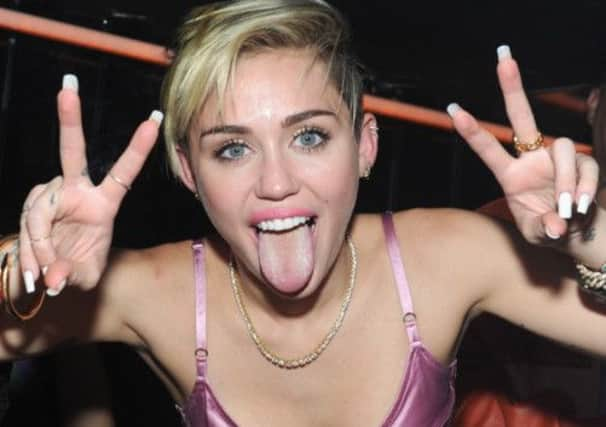Andrew Eaton-Lewis: The Miley Cyrus dilemma


The novelist was writing his solo show Ban This Filth!, a well-meaning defence of divisive feminist campaigner Andrea Dworkin, told from the perspective of a man guiltily waking up to the damage caused by pornography. Suddenly female sex workers were attacking him on Twitter, defending their right to work in an industry that – in Dworkin’s view, and now Bissett’s – was exploiting them. Who was Bissett to tell them how to live their lives?
Result: Bissett wrote a new ending in which he admitted, to his credit, that feminism might be more difficult to get his head round than he’d initially thought (if you missed the show at the Edinburgh Fringe, it’s at Dundee Literary Festival on 26 October).
Advertisement
Hide AdAdvertisement
Hide AdI’ve been through a similar process lately. A month ago I wrote a tutting column on this page, arguing that Miley Cyrus’s sexually explicit performance at the VMA Awards pandered to the most misogynist of male fantasies and sent an unhealthy message to children. So I felt like applauding when I read Sinead O’Connor’s open letter to Cyrus, warning that the music industry will “prostitute you for all that you are worth, and cleverly make you think it’s what you wanted”.
And then it got more complicated. People like the American artist Marilyn Minter argued Cyrus was being “slut shamed” by her critics, and that “there’s a ceiling for women owning sexuality in any shape or form”. There was a tub-thumping, manifesto-like blog by Amanda Palmer, respectful to O’Connor but also speaking up for Cyrus. “I want to live in a world where we as women decide whether or not we’re going to play games with the male gaze,” wrote the singer, essentially suggesting that those who criticise Cyrus are guilty of victim-blaming – the showbiz equivalent of ‘if you go out dressed like that, you might get raped’.
Interestingly, when wise old Annie Lennox joined in on Monday, she initially echoed O’Connor, describing “overtly sexualised” performances like Cyrus’s as “a glorified and monetized form of self-harm… misogyny, utilized and displayed through oneself”. Within 24 hours, though, she had completely revised her argument (while skilfully giving the impression she hadn’t): “There’s nothing wrong with sexuality and sensuality and I think these artists are beautiful, but it needs to be age-appropriate.” The problem was no longer “monetized self-harm”, then, but what impact Cyrus and co are having on young viewers.
Except now I’m beginning to wonder whether this isn’t slut-shaming too – a very particular form of it, in which the middle-aged try to shame the young for their foolhardiness, in an effort to assert themselves as a wiser “voice of reason”. Last week Julie Burchill accused O’Connor of doing just this, acting like “a very dreary blend of a tarot-card reader, prim headmistress and unsolicited agony aunt”, feigning concern while actually just “carping at a younger, prettier woman who sells records in the quantity you used to”.
I can’t help feeling that O’Connor’s escalating anger (three more open letters, at time of writing) has been prompted less by Cyrus’s cheap jokes about mental illness than by her lack of respect generally. Anyone who has offered sage advice to someone younger, and then seen it mockingly dismissed, knows how humiliating this is. As we lose our youth and our looks, we try to feel better by telling ourselves we are, at least, wiser than those impossibly young and beautiful people. When they laugh in our faces, as Cyrus has done to O’Connor, it hurts.
This, I suspect, is at least part of the motivation when middle-aged people try to “protect” children – if 21-year-olds think we’re ridiculous, well, at least kids might still look up to us.
And so, a month on, I see Miley Cyrus and I’m very unsure what I’m looking at. Mostly she seems ridiculous and embarrassing, but is that because she’s emblematic of the institutional misogyny (and racism, but that’s a whole other column) of the music industry? Or is it because she’s a young, beautiful woman having more fun and making more money than me, and I’m repressing my resentment? And how much of a factor is my own “male gaze”? If you’re reading this, Alan, I think I’ve got an idea for a Ban This Filth! sequel.
Twitter: @Aeatonlewis